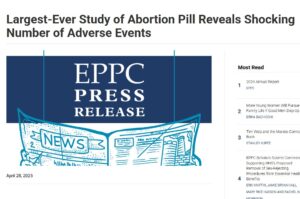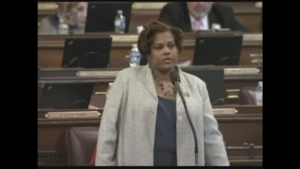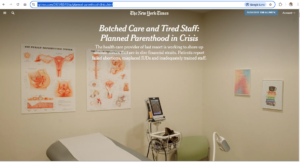HARRISBURG, PA—The Commonwealth Court convened on Wednesday to hear oral arguments in the case of Allegheny Reproductive Health Center v. Pennsylvania Department of Human Services, a pivotal lawsuit that could force Pennsylvania taxpayers to fund elective abortions. This case represents yet another attempt by the abortion industry to dismantle long-standing pro-life protections and impose an extreme pro-abortion agenda through judicial activism rather than the democratic process.
The petitioners in this case are a group of abortion providers, including Allegheny Reproductive Health Center, Planned Parenthood, and other abortion clinics operating in Pennsylvania. They are seeking a court ruling that would establish a state constitutional right to abortion and mandate taxpayer funding for elective abortions through Medicaid.
Their argument is that Pennsylvania’s existing prohibition on taxpayer-funded abortions violates the state constitution. If successful, their case could lead to the repeal of long-standing pro-life protections, force taxpayers to fund abortion on demand, and potentially legalize abortion up to the moment of birth.
Key Insights from Oral Arguments
The seven-judge panel, consisting of four Republicans and three Democrats, focused on serious procedural concerns, particularly the troubling alignment of the Pennsylvania Department of Human Services (DHS) with the petitioners—despite its duty to defend the law. Judges rightfully questioned how justice could be served when there was no government entity willing to uphold Pennsylvania’s decades-old prohibition on taxpayer-funded abortion. As we reported back in July, Governor Shapiro announced his administration would not defend Pennsylvania’s longstanding law to protect taxpayer funds from paying for elective abortions.
Judge Patricia McCullough correctly framed the fundamental issue: Should taxpayers be forced to subsidize elective abortions? This question lies at the heart of the case, as radical abortion advocates attempt to bypass the will of the people and legislate from the bench. The judges also debated whether abortion should be reclassified as a “medically necessary” procedure, a notion that runs counter to medical reality and longstanding pro-life legal precedent.
Overall, the court signaled strong reservations about granting the petitioners a summary ruling without a full adversarial process. Several judges expressed the need for discovery to properly examine the legal and factual claims, further delaying the abortion industry’s latest attempt to impose taxpayer-funded abortion.
Case Background
The Pennsylvania Constitution contains no right to abortion and no requirement for taxpayer funding of abortion (although our Abortion Control Act explicitly states that no public funds should be used to pay for elective abortions). However, abortion providers—led by Planned Parenthood and other industry giants—seek to invent such a right through judicial fiat.
More details on the case can be found here.
Case Status
Following today’s arguments, it is increasingly clear that the Commonwealth Court is not inclined to simply rubber-stamp the abortion industry’s demands. Judges expressed deep concerns over the lack of a legitimate adversarial process and the absence of any state official willing to defend Pennsylvania’s long-standing pro-life protections. The role of the newly elected attorney general in potentially stepping up to defend the law was also a major topic of discussion.
Governor Josh Shapiro’s administration has openly refused to fulfill its duty to defend the law, instead siding with pro-abortion activists in their efforts to strike down Pennsylvania’s prohibition on taxpayer-funded abortions. In response, the court has invited the Pennsylvania House Republicans to present arguments in defense of the law, ensuring that pro-life voices are heard.
Independence Law Center’s Role
The Independence Law Center (ILC) has taken a leading role in defending life, filing an amicus brief on behalf of eight women who were harmed by abortion. Their testimonies highlight the devastating physical, emotional, and psychological toll of abortion and expose the manipulative tactics used to coerce women into ending their pregnancies. ILC has also previously filed a brief exposing the abortion industry’s dark history of targeting Black communities.
More details on ILC’s involvement can be found here.
Looking Ahead
As the Commonwealth Court deliberates, the fundamental question remains: Should taxpayers be required to fund elective abortions in Pennsylvania? The judges’ inquiries during oral arguments suggest they are leaning toward allowing further legal proceedings rather than issuing a summary ruling in favor of the petitioners.
This case carries profound implications not just for taxpayer funding of abortion but for the broader legal landscape surrounding abortion rights in Pennsylvania. The court’s decision in the coming months will shape the state’s policies for years to come.
For more details, you can read the Independence Law Center’s amicus brief here: Amicus Brief.






Medicaid recipients represent over half of the people giving birth in this country. That means low-income families who may not be able to provide for a child. It’s a difficult decision, but if a person chooses to make that decision I would 100% rather my tax payer dollars fund an abortion, which is a minimal cost and helps the woman work toward financial independence, than have my tax payer dollars support an entire life of schooling, welfare, healthcare, etc. And this additional cost doesn’t improve the woman’s life, it keeps her from achieving financial independence and keeps her on welfare.
Thank you for your heartfelt comment Annelise. But I must point out that your argument assumes that financial cost is a justifiable reason to end a human life. It is not. And you ignore the real question — when is a human a human and alive?
If I applied this same logic to born individuals, we would never accept it. Should we allow the killing of two-year-olds in low-income families because they require food, healthcare, and schooling? If financial burden justified ending a human life, then we would have to extend that justification beyond the unborn—to toddlers, the elderly, the disabled, and anyone else deemed “too expensive” to support.
The core issue is not cost, but humanity.
A preborn or unborn child is just as human as a newborn. The fact remains that the only differences between the unborn and the born—size, level of development, environment, and dependency—do not change their intrinsic value or right to life. Denying the unborn protection simply because they are more dependent on their mothers, or because the mother would face financial hardship, is an unjust form of discrimination.
Furthermore, your argument assumes that abortion improves a woman’s financial situation. However, research shows that abortion is more likely to contribute to depression, anxiety, and a higher likelihood of future poverty, not financial independence. In contrast, many pro-life organizations provide resources, childcare assistance, education, and job training to help women achieve independence without requiring them to sacrifice their child’s life. You’ve presented a false choice — financial independence or a human life.
The real solution is not eliminating children but eliminating the barriers that make parenting difficult. If society believes that low-income mothers and children are a financial burden, then our moral obligation is to support them—not to eliminate them.
http://www.pafamily.org has a page that lists a wide range of services to pregnant and parenting women. The list only includes government programs, but there are hundreds of Pregnancy care centers that also provide great resources and help connect individuals with more local and nonprofit resources.
https://pafamily.org/catalog-of-existing-pennsylvania-government-services-for-pregnant-and-parenting-women/
A just society protects its most vulnerable, rather than suggesting their lives are expendable for economic convenience. I’m sure this wasn’t what you were saying.